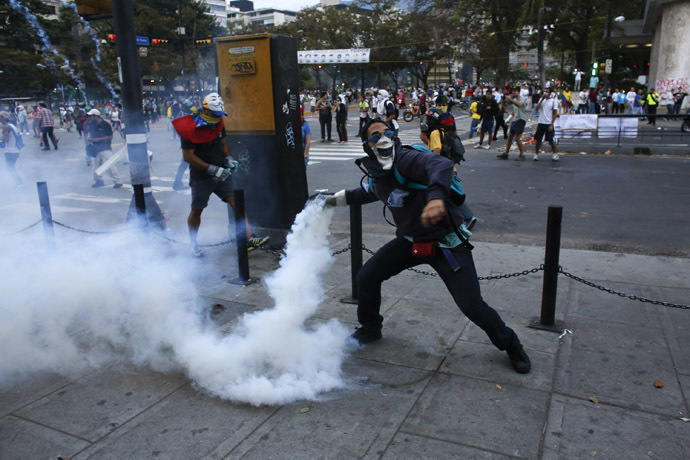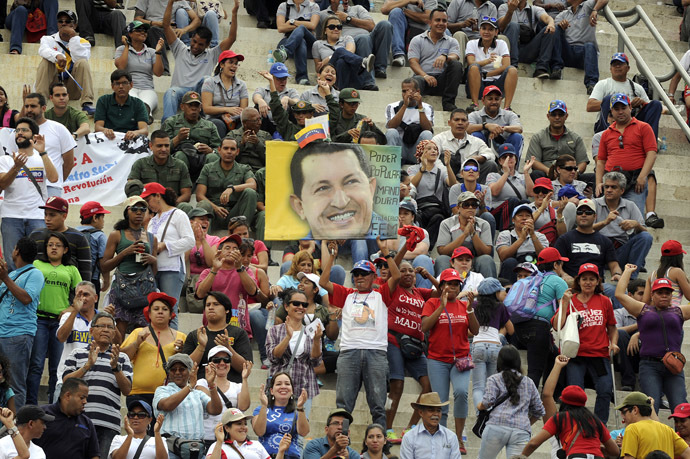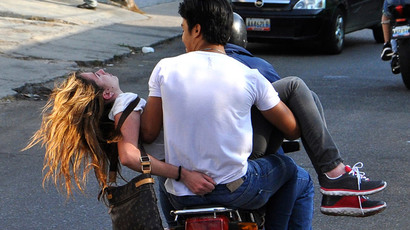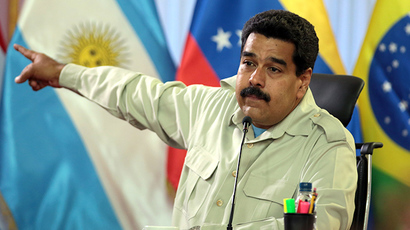Students and police clash in Venezuela protests
Student protesters have clashed with police in Caracas, prompting officers to use tear gas to break up the crowds. It comes after almost two weeks of massive street demonstrations that the government has condemned as an attempted coup d’état.
Students marched through the Venezuelan capital on Thursday, demanding the release of their peers who were detained during the last two weeks of protests. The demonstration descended into violence when a group of masked protesters attempted to block a road in central Caracas. The police used tear gas to break up the crowd, while demonstrators pelted officers with stones.

“[President] Maduro, tell us when and where you are going to release the prisoners. Tell us when there will be justice for our dead,” the head of the student protest movement, Juan Requesens, addressed protesters on Thursday.
Over 50 people have died in the mass protests that have gripped Venezuela over the last couple of weeks, according to government figures. President Nicolas Maduro decried the unrest as an attempt at a coup d’état orchestrated by fascist elements in the Venezuelan opposition.

“There will be no coup d'etat in Venezuela; you can rest
assured. Democracy will continue, and the revolution will
continue,” Maduro said on national television on Wednesday.
The head of the Venezuelan government has also pointed the figure
at President Barack Obama for “financing, promoting and
defending members of the opposition that promote violence against
our country.”
Elsewhere in Caracas on Thursday government supporters gathered
to celebrate the 25th anniversary of the Caracazo – violent
protests against economic measures imposed in 1989 that left
hundreds of people dead. The historical event is widely believed
to have prompted the civic-military rebellion led by Hugo Chavez
that happened three years later in 1992.

The latest wave of violence in Venezuela comes on the heels of
the arrest of opposition leader Leopoldo Lopez who handed himself
into police custody last week. The Harvard-educated opposition
figure is facing charges of inciting violent protests which
carries a potential jail sentence of ten years.
Lopez was initially accused of murder, but his lawyers say these
charges have been dropped by prosecutors.
"I said, 'Send him to jail,' and that's what happened and that's
what will happen with all of the fascists. I won't allow him to
challenge the people of Venezuela, the constitution,” said
Maduro shortly after Lopez’s arrest.
Following the arrest Maduro announced the expulsion of three US
diplomats from Venezuela whom he accused of a “fascist”
conspiracy to oust the socialist government.
In response, Washington gave three Venezuelan diplomats 48 hours
to leave the United States and denied the US had anything to do
with the unrest.














